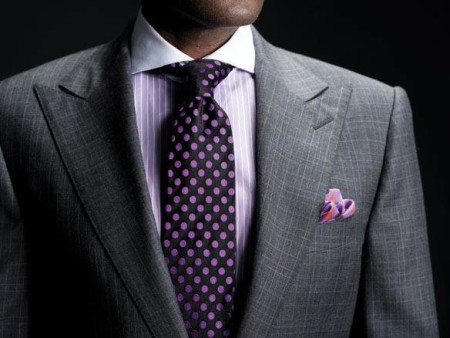A Man’s Tie – Finding the Perfect Match
 The right men’s tie can be the polish that gives an outfit the perfect shine.
The right men’s tie can be the polish that gives an outfit the perfect shine.
But with an infinite number of colors, patterns, and fabrics to choose from the gentleman can be left with a difficult choice of which one to choose.
For many men, the solution is to avoid variety and stick with a small collection of solid colored or simple striped ties.
While there is nothing wrong with conservative solids and stripes, the multitude of options available makes a strong case for injecting some variety into the wardrobe.
The Solid Tie
Looking at color and pattern options, the most basic is the solid. A solid tie is easiest to match; one simply selects a tie that coordinates with one of the colors in the suit or shirt.
However, within this simplicity lies the danger of over coordination, the faux pas of looking too matched or having put to much time into the outfit.
Avoid a blue tie and blue shirt with a navy blue suit; combinations such as this often look forced. Instead think of the tie as your chance to interject something new and exciting.
The Striped Tie
 Equally classic is the men’s stripe tie, which is easily matched with solid suits and shirts by selecting a stripe that complements.
Equally classic is the men’s stripe tie, which is easily matched with solid suits and shirts by selecting a stripe that complements.
In the case of a patterned jacket, shirt, or both, the key is to maintain colors that complement and attend to diversity of scale.
A finely pinstriped suit calls for a boldly striped tie, while a strong checked shirt would be better suited by a more subdued stripe.
One note of caution about striped ties: Like the various Scottish tartans, in the United Kingdom, certain stripe patterns signify membership in a particular group, particularly military units, universities, and gentlemen’s clubs.
When interacting with business contacts in the UK, it is good practice to check with a knowledgeable party that ones tie does not bear the stripe of a group or association.
The Plaid Tie
Harder to find, this choice of neckwear is a great way to embolden an otherwise plain outfit.
Creating the illusion of dimension, this tie will draw attention to itself so do not pair it with an overpowering shirt. Look to pair this tie with solid colored suits and shirts.
Dots, Paisley, and Figure Ties
 Polka dots, paisley, and figure – meaning small repeating images such as a university/club/military crest – have become much more common over the years.
Polka dots, paisley, and figure – meaning small repeating images such as a university/club/military crest – have become much more common over the years.
If kept in good taste, avoiding flamboyant colors and designs, these ties can liven up any solid or striped suit.
Such ties are matched to an ensemble by their primary color, with attention paid to avoiding secondary colors that visibly clash with the shirt and suit.
As before, when the shirt, suit, or both are also patterned, the key is to maintain a difference in scale between the patterns.
Men’s Tie Construction
Always look for quality material and good construction when choosing a tie, and avoid anything that appears poorly crafted. The most common material in ties construction is silk, and for most it is considered the gold standard.
Beware of cheap polyester impostors; polyester doesn’t possess the same drape as silk, and tends to bear a high sheen that leaves an impression of poor quality.
With some attention to detail and an eye towards elegance, a gentleman can quickly become a master at selecting the perfect tie to complete his carefully chosen ensemble.
While the solid silk option is a safe and classic choice, one should not be afraid to venture into the world of bolder patterns and textured fabrics.
It is this sort of confident stylistic venture that sets the gentleman’s wardrobe apart from that of the uninitiated.
